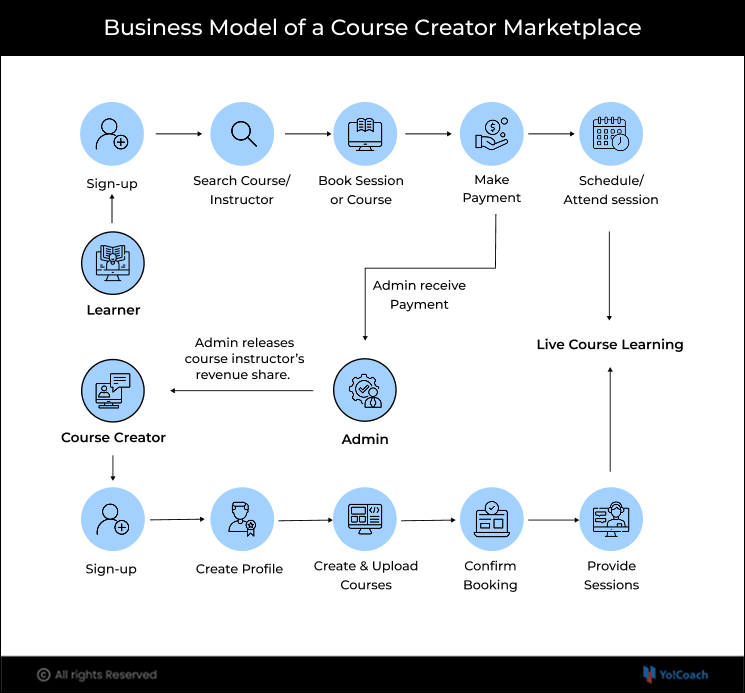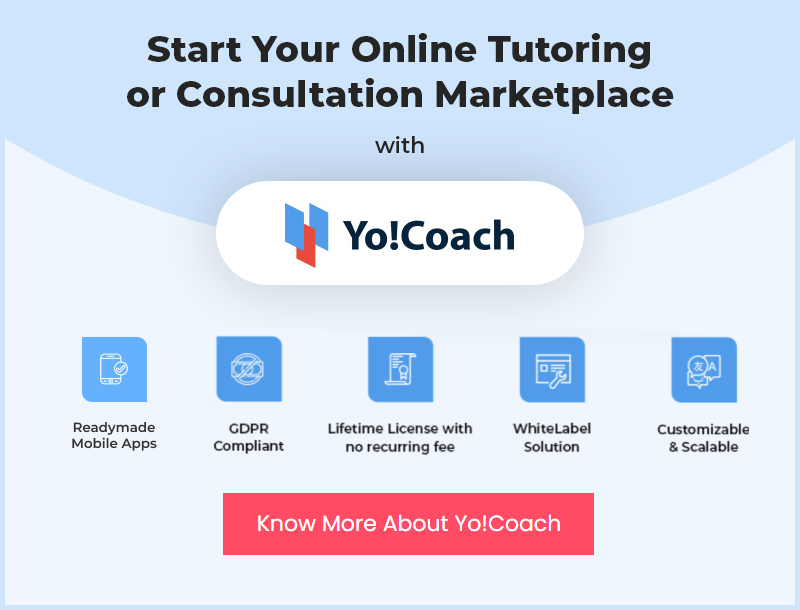Education has always been a cornerstone of progress, but the way we access it has changed dramatically. With technology reshaping industries, learning has shifted from classrooms to laptops and smartphones. Today, learners don’t just seek degrees; they want flexible, accessible, and affordable ways to gain new skills, whether it’s coding, photography, design, or leadership.
This demand has fueled the rise of online learning platforms, and among them, the course creator marketplace model stands out. Unlike platforms where one institution or individual controls all content, a marketplace empowers multiple instructors to create and sell courses, while learners benefit from variety and choice. For entrepreneurs, this model offers unmatched scalability, multiple revenue streams, and community-driven growth.
But how do you actually build one? Let’s dive deep into what a course creator marketplace is, why it works, the benefits it offers, and the step-by-step process to create a platform that attracts both learners and educators.
Table of Contents
What is an Online Course Creator Marketplace?
An online course creator marketplace is a digital hub that connects instructors with learners. It’s not just a website offering courses; it’s an ecosystem where instructors can upload content, set pricing, and build credibility, while learners can explore, compare, purchase, and complete courses.
The marketplace owner acts as the facilitator, providing the infrastructure, ensuring smooth transactions, managing quality, and generating revenue through commissions or subscriptions.
Well-known platforms like Udemy, Skillshare, and Coursera follow this model, hosting thousands of instructors and millions of learners. Their success highlights the power of creating a space where content comes from the community rather than a single source, which is exactly the goal when you build an online course creator marketplace.
The Growing Demand for Online Learning
The appeal of online education is rooted in convenience, accessibility, and necessity. Several factors drive its continued growth:
- Global Market Size: Analysts predict the eLearning market will surpass $400 billion by 2030, fueled by digital adoption worldwide.
- Lifelong Learning: People no longer stop learning after college; they upskill throughout their careers to remain competitive.
- Corporate Training: Companies rely on online learning for employee development, reducing costs and scaling training across teams.
- Post-Pandemic Culture: COVID-19 cemented online learning as a mainstream option, accelerating digital transformation in education.
In short, the market is booming, and there’s still space for new players, especially niche-focused marketplaces that cater to specialized skills or industries, which is exactly the goal when you build an online course creator marketplace.
Understanding the Marketplace Model
At its core, a course creator marketplace thrives on interactions between three groups: the admin, course creators/instructors, learners/students, and more.
1. The Admin (Platform Owner)
- Provides the infrastructure: website, hosting, payment gateways, and tools.
- Sets policies for pricing, quality, and certifications.
- Generates revenue through various monetization strategies (commissions, subscriptions, advertising).
- Ensures platform stability, marketing, and compliance.
2. Course Creators/Instructors
- Experts or educators who bring value by creating and uploading courses.
- Use built-in tools to structure courses with videos, assignments, quizzes, and downloadable materials.
- Earn revenue by selling courses, while also building personal brands and reputations.
- Interact with students through reviews, Q&A forums, or live sessions.
3. Learners/Students
- Individuals or organizations are purchasing courses to upskill.
- Rely on features like search filters, ratings, and reviews to make informed decisions.
- Access courses across devices for convenience.
- Expect proof of achievement through certificates or completion badges.
How the Model Works in Practice
- Instructors upload their content/courses to the platform.
- Learners browse and purchase courses.
- The admin manages the payment process, deducts a commission, and releases earnings to instructors.
- Reviews and ratings create trust, attracting more learners and instructors.
This creates a self-sustaining ecosystem: more instructors are directly proportional to more courses, which attract more learners, which in turn motivates more instructors to join. That’s why the marketplace model is so powerful and scales organically. Learning how to build an online course creator marketplace ensures that your platform can replicate this successful cycle.

Key Benefits of Launching a Course Creator Marketplace
Building and launching a course creator marketplace promises many lucrative business opportunities. Let’s explore the key benefits.
1. Multiple Revenue Streams
Marketplaces are not limited to course sales. You can generate income through:
- Commissions: A percentage of every course sold.
- Subscriptions: Learners pay monthly/annually for unlimited access.
- Featured Listings: Instructors pay to highlight their courses.
- Certification Fees: Charge for accredited or verified certificates.
- Corporate Partnerships: Offer bulk course packages to organizations.
This diversification ensures stability, even if one revenue channel underperforms, a major advantage when you build an online course creator marketplace.
2. Scalability and Community-Driven Growth
The platform grows as more instructors and learners join. Unlike traditional businesses that scale with direct effort, marketplaces thrive on network effects. With every new instructor, the platform gains fresh content; with every new learner, demand rises, attracting even more instructors.
3. Better Learner Choice and Engagement
Learners benefit from a wide variety of teaching styles, price points, and course formats. Reviews and ratings guide them to the best options, increasing satisfaction and engagement. This diversity keeps learners returning to the platform.
4. Reduced Dependency on a Single Creator
The risk of relying on one source of content disappears. If an instructor leaves, others continue to drive growth, ensuring the platform remains stable and appealing.
Interested in Launching Your Own Online Course Creator Marketplace?
Steps to Build an Online Course Creator Marketplace
Now, let’s dive into the five major steps to launch a successful platform. Each step builds the foundation for a marketplace that can thrive long-term.
Step 1: Market Research & Planning
Every strong business begins with research. Marketplaces succeed when they fill real gaps. If you don’t understand your audience, competitors, and market demand, you risk building something nobody truly needs.
- Competitor Analysis: Study global players like Udemy and niche ones like Codecademy. What features do they offer? Where do learners complain? Those gaps can become your opportunity.
- Audience Personas: Define your target groups, are you serving students, working professionals, or companies? Knowing their needs helps design relevant features and content.
- Gap Identification: Maybe existing platforms lack personalized learning, language-specific courses, or affordable pricing. Highlight these as your differentiators.
Benefit of market research
Comprehensive research ensures your platform enters the market with clarity, differentiation, and confidence. You’ll avoid costly mistakes and build a product that resonates with real users, crucial when you build an online course creator marketplace.
Step 2: Decide Niche & Revenue Model
General platforms are vast, but starting with a niche focus helps you stand out. A marketplace for coding, fitness, photography, or even language learning can carve out a dedicated user base faster than competing with giants.
- Choose a Niche: Align with your passion or market gaps. Niche platforms often build stronger communities because they target specific problems.
- Select Revenue Models:
- Commission for flexibility.
- Subscriptions for a steady income.
- Featured Listings for extra instructor incentives.
- Certificates for added learner motivation.
- Hybrid Model combining multiple streams.
- Commission for flexibility.
Benefit of choosing a specific niche & determining your revenue model
A clear niche helps marketing efforts, reduces competition, and fosters loyalty. A robust revenue model ensures profitability from day one when you build an online course creator marketplace.
Step 3: Finalize Core Features
Features are the heart of your platform. A marketplace must serve three groups—admins, instructors, and learners, each with distinct needs. Neglecting any one of them weakens the entire ecosystem.
Features for Admin/Platform Owner
- Admin Dashboard
A powerful, centralized dashboard gives the platform owner complete visibility into daily operations. From tracking user sign-ups and monitoring instructor activity to analyzing revenue and course performance, it provides a one-stop control panel to manage and optimize marketplace growth.
- Revenue Management
Admins can securely manage financial aspects, including commissions, instructor payouts, refunds, and tax records. Built-in automation reduces errors, ensures transparency, and provides clear financial reporting, enabling platform owners to focus on scaling the business instead of manual bookkeeping.
- Approval Workflows
Quality assurance is essential in online education. With approval workflows, admins can review and approve new instructor profiles and courses before they go live, ensuring only credible educators and high-quality content are published on the platform.
- Marketing Tools
Inbuilt marketing capabilities such as SEO-friendly URLs, promotional discount codes, affiliate options, and advanced analytics empower platform owners to improve visibility, attract learners, and retain them. These tools make it easier to run campaigns without third-party dependencies.
Features for Instructors
- Course Builder
The intuitive course builder lets instructors create engaging learning materials by uploading videos, PDFs, documents, assignments, and quizzes. With drag-and-drop ease, even non-technical educators can design structured, interactive courses that cater to different learning styles.
- Branding Options
Instructors can showcase their expertise by creating detailed profiles with bios, photos, and personal branding elements. These options allow them to build trust with students, differentiate themselves from competitors, and create a professional identity on the platform.
- Payment Withdrawals
Timely and flexible payments are critical for instructor satisfaction. Platforms can offer multiple payout methods, such as bank transfers, PayPal, or e-wallets, ensuring instructors have seamless access to their earnings with minimal delays or technical hurdles.
- Student Engagement Tools
Instructors can foster vibrant learning communities through features like Q&A sections, dedicated discussion forums, and the ability to respond to reviews. These tools encourage ongoing interaction, boost learner satisfaction, and improve overall course completion rates.
Features for Learners
- Advanced Search
Learners can easily discover the right courses with advanced search filters based on topic, price, ratings, duration, and skill level. This helps students save time, improves satisfaction, and ensures they find content tailored to their learning needs.
- Multi-Device Access
Students can access courses across desktops, tablets, and smartphones, making learning flexible and convenient. Whether at home, during commutes, or on the go, seamless cross-device compatibility ensures uninterrupted access to educational content anytime, anywhere.
- Ratings & Reviews
Transparent ratings and student reviews build trust and credibility in the marketplace. Learners can make informed choices based on the experiences of previous students, while instructors benefit from constructive feedback that helps improve course quality.
- Certificates
Upon completing a course, learners can receive digital certificates or shareable proof of completion. These certificates validate their skills, can be added to resumes or LinkedIn profiles, and motivate learners to finish courses while showcasing tangible achievements.
- Benefits of integrating advanced features
When features are well-designed, all stakeholders benefit, admins scale faster, instructors earn more, and learners stay engaged, key for successfully building an online course creator marketplace.
Want to Launch a Feature-Rich Course Creator Marketplace?
Step 4: Platform Development
Once you have a clear business plan, chosen your niche, and finalized the core features, the next critical step is marketplace development. At this stage, entrepreneurs face one of the most important decisions: whether to invest in custom development or opt for readymade software. Both approaches have their strengths and limitations, and the right choice depends on your budget, time-to-market requirements, and long-term vision for the business.
1. Custom Development
Custom development means building your course creator marketplace from scratch, typically by hiring a team of developers or working with an agency. Everything, from design to functionality to integrations, is built according to your specific requirements.
Pros
- Full customization: You have complete freedom to design and build unique features that set your platform apart.
- Scalability: The platform can be scaled as you grow, without being limited by pre-built structures.
- Ownership: Since you own the code, you have more control over updates, modifications, and future innovations.
Cons
- High costs: Developing from scratch requires a significant investment in both development and ongoing maintenance.
- Time-consuming: Custom platforms can take many months (sometimes a year or more) to build and launch.
- Complex management: You’ll need ongoing support from developers to fix bugs, implement updates, and handle security patches.
2. Readymade Software
Readymade software provides a pre-built framework that comes with essential features needed for launching a course creator marketplace. These solutions are designed with online education in mind, so you can skip the complexities of building from scratch and focus on branding, customization, and attracting users.
Pros
- Quick launch: Get your marketplace up and running within weeks instead of months.
- Cost-effective: A much lower upfront cost compared to custom development.
- Proven model: Comes with built-in features like instructor dashboards, course creation tools, and payment gateways.
- Ease of use: Even non-technical founders can manage most functions with ease.
Cons
- Limited customization: While customizable to a degree, some features may not allow the same flexibility as a custom-built solution.
- Dependency on vendor: You may rely on the software provider for updates, new features, and long-term support.
Benefits of Choosing a Development Approach
By determining your development approach (custom development or readymade software) you can pre-decide the budget, timeline to launch your marketplace, and other important aspects.
How Yo!Coach Can Help
Launching a course creator marketplace requires not just software but a reliable, feature-rich, and scalable solution that balances affordability with flexibility. This is where Yo!Coach comes in.
1. Tailor-Made for Online Learning
Unlike generic marketplace solutions, Yo!Coach is built specifically for the online education sector. It comes with advanced features like video conferencing integrations, multilingual support, and interactive course creation tools that empower instructors to deliver high-quality learning experiences.
2. Comprehensive Feature Set
Yo!Coach provides all the essential modules needed for a multi-vendor course creator marketplace:
- Admin Dashboard: Full control over users, courses, and revenue management.
- Instructor Tools: Easy-to-use course builder with support for videos, quizzes, and downloadable resources.
- Learner Experience: Intuitive search, reviews, certifications, and mobile responsiveness for seamless learning anytime, anywhere.
Yo!Coach offers many other advanced features that assure satisfactory learning experience, operation management, and seamless running of the course creator marketplace.
3. Faster Time-to-Market
With Yo!Coach, you don’t need to wait months to launch. Its pre-built foundation allows you to go live quickly, giving you a head start in attracting instructors and learners while your competitors may still be in development.
4. Cost-Effective Scalability
Instead of spending heavily on custom development, Yo!Coach allows you to start with a solid base at a fraction of the cost. As your business grows, the platform can be customized and is scalable enough to match your evolving needs.
5. Reliability and Support
Yo!Coach comes from FATbit Technologies, a trusted name in software development with years of experience in delivering online learning solutions. You not only get robust software but also continuous support, ensuring your marketplace runs smoothly and securely.
Step 5: Launch & Marketing
A great platform is only the beginning. Without marketing, your audience won’t find it. A strategic launch builds trust, attracts instructors, and drives early learner adoption.
Execute Marketing Plan:
- Onboard Early Instructors: Reach out to experts in your niche and offer incentives to join early. Seed the platform with quality content.
- SEO Strategy: Optimize course pages and blogs for keywords learners search for.
- Content Marketing: Publish helpful guides, success stories, and tutorials to build authority.
- Social Media Presence: Showcase courses and testimonials on LinkedIn, Instagram, and YouTube.
- Influencer Collaborations: Partner with educators, coaches, or industry experts to attract credibility and reach.
Benefits
An effective launch ensures steady growth from the start. By focusing on trust-building and visibility, you create momentum that attracts both learners and instructors, essential when you build an online course creator marketplace.
Discover Features and Capabilities of Yo!Coach with Experts
Conclusion
The education landscape is evolving, and online learning is no longer optional, it’s essential. Launching a course creator marketplace allows you to tap into this demand while building a scalable, profitable, and future-ready business.
By conducting research, defining a niche, equipping your platform with powerful features, and choosing the right development approach, you set yourself up for success.
FAQs
Q 1. Why should I build an online course creator marketplace instead of a single course website?
Ans. A marketplace allows you to scale faster, attract a wider audience, and generate multiple revenue streams. You’re not dependent on one instructor or course, and community-driven growth increases engagement and trust.
Q 2. Can I choose a niche for my marketplace?
Ans. Yes. While general platforms work, starting with a niche—like coding, fitness, language learning, or photography—helps you target specific learners, reduce competition, and build a strong community.
Q 3 . How long does it take to launch a marketplace?
Ans. With readymade solutions like Yo!Coach, you can launch within weeks. Custom development may take several months to over a year, depending on complexity.
Q 4. Do I need technical skills to launch with Yo!Coach?
Ans. No. Yo!Coach is designed for non-technical founders. Its intuitive interface allows you to manage courses, instructors, and learners without coding knowledge.
Q 5. Can I scale my marketplace as it grows?
Ans. Absolutely. Yo!Coach supports platform scalability. You can add new instructors, courses, and features as your marketplace expands, ensuring long-term growth.

